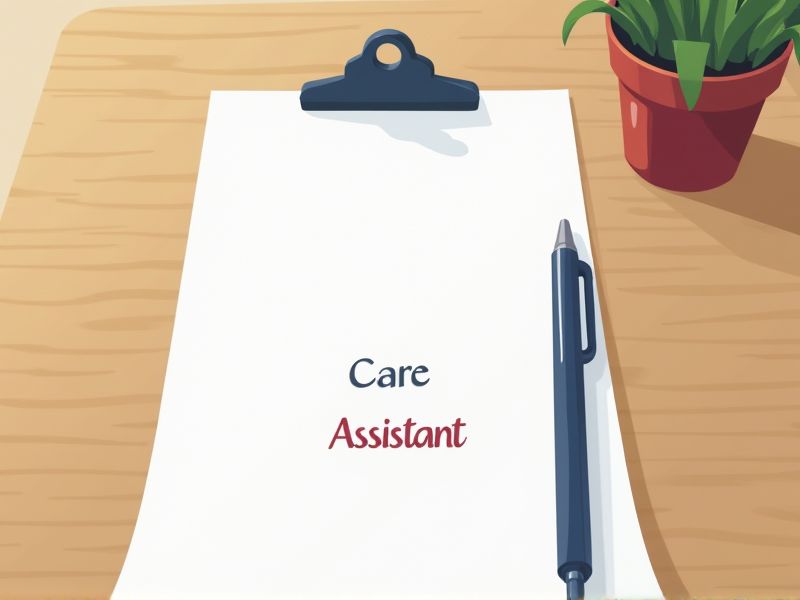
Personal Care Assistants (PCAs) play an essential role in providing support to individuals who require assistance with daily activities. Due to the sensitive nature of their work, ensuring a high standard of care and safety becomes critical. Specific certifications equip PCAs with the knowledge and skills necessary to address unique medical and personal needs efficiently. Common certifications for Personal Care Assistants include First Aid, CPR, and Certified Nursing Assistant (CNA).
Certified Nursing Assistant (CNA)
A Certified Nursing Assistant (CNA) possesses essential medical training that enhances the quality of care provided by a Personal Care Assistant. As a CNA, they can monitor vital signs and recognize health-related concerns, which supports timely medical intervention. Their certification ensures adherence to healthcare standards, promoting safety and trust for individuals receiving care. Training as a CNA equips individuals with skills to manage both basic daily living activities and complex healthcare tasks effectively.
Home Health Aide (HHA) Certification
Home Health Aide (HHA) Certification ensures that personal care assistants meet standardized competence levels, which boosts the quality of care for patients. The certification process familiarizes assistants with essential medical and caregiving techniques, enhancing safety and reliability in providing care. With HHA Certification, personal care assistants can access more employment opportunities, as many employers prefer or require this credential. Certification also reassures families and patients that the care received adheres to regulated guidelines, fostering trust in professional services.
CPR and First Aid Certification
Having CPR and First Aid Certification equips personal care assistants with the skills to respond effectively during medical emergencies, enhancing client safety. This certification ensures that assistants can handle situations like choking or sudden cardiac events, which are common risks in caregiving. Employers often require this certification to ensure a standard level of preparedness and care quality among their staff. Moreover, it instills confidence in clients and their families, knowing their caregiver can provide immediate and knowledgeable assistance in emergencies.
Medication Administration Certification
Medication Administration Certification is necessary for Personal Care Assistants to ensure the safe and accurate dispensing of medication to clients. It helps reduce the risk of medication errors and potential harm. Certification instills trust and confidence in clients and their families regarding the assistant's abilities. It aligns with regulatory requirements, promoting standardized practices in healthcare settings.
Infection Control and Safety Certification
Infection Control and Safety Certification ensures that Personal Care Assistants are well-equipped with the necessary skills to prevent the spread of infectious diseases. By understanding proper hygiene and sanitation practices, they reduce the risk of infection to vulnerable individuals they care for. Certification establishes a standard of competency, contributing to increased trust from clients and employers. Regulatory requirements or accreditation standards often mandate such certification to ensure consistent and safe care practices.
Bloodborne Pathogens Certification
Personal Care Assistants (PCAs) frequently work in environments where exposure to bloodborne pathogens is possible, making certification essential for understanding and mitigating risks. Certification ensures that PCAs are educated on proper hygiene practices and precautionary measures, reducing the likelihood of disease transmission. The training provides knowledge on how to respond effectively in situations involving contact with bodily fluids, thereby enhancing safety for both caregivers and recipients. Employers and clients often require certified PCAs, as it demonstrates commitment to health standards and professional responsibility.
Safe Patient Handling Certification
Safe Patient Handling Certification is needed for Personal Care Assistants to reduce the risk of injury for both the caregiver and the patient during physical tasks like lifting or repositioning. Certification ensures that assistants are trained on proper techniques, leading to improved patient safety and comfort. Hospitals and care facilities often require this certification to comply with legal and regulatory standards for workplace safety. It demonstrates a commitment to professional development and can enhance employment opportunities for personal care assistants.
HIPAA Compliance Training Certification
HIPAA Compliance Training Certification is essential for Personal Care Assistants to ensure they understand and uphold the privacy rights of their clients' health information. This training helps prevent unauthorized access and disclosure of sensitive patient data, which can lead to legal ramifications and loss of trust. By completing this certification, Personal Care Assistants can effectively adhere to federal regulations and maintain the confidentiality of medical records. This knowledge is crucial in fostering a secure and ethical healthcare environment, contributing to a safer space for patient care.
Dementia and Alzheimer's Care Certification
Dementia and Alzheimer's care certification equips personal care assistants with specialized skills necessary to manage the complex needs of these patients effectively. This training ensures they can provide appropriate interventions to maintain quality of life and reduce distress among patients. In the absence of this certification, care might be inadequate, leading to increased patient agitation and potential health decline. Certification also establishes a standard of care that can enhance trust and credibility with families of those affected.
Mental Health First Aid Certification
Mental Health First Aid Certification equips Personal Care Assistants with the skills to identify and respond to mental health crises, which leads to improved care outcomes for clients. By understanding signs of mental health issues, they can intervene early, potentially preventing further escalation of the situation. This knowledge fosters a supportive environment, enhancing the trust and communication between assistants and their clients. Having this certification aligns with industry standards, ensuring that care assistants meet the growing expectations regarding comprehensive care.
Summary
You can expect increased job opportunities when a Personal Care Assistant obtains certifications. Employers are likely to favor certified assistants due to their proven skills and commitment to quality care. This can lead to higher job security and potential salary increases for certified individuals. Clients may also feel more confident and trust the ability of certified assistants to provide excellent care.
